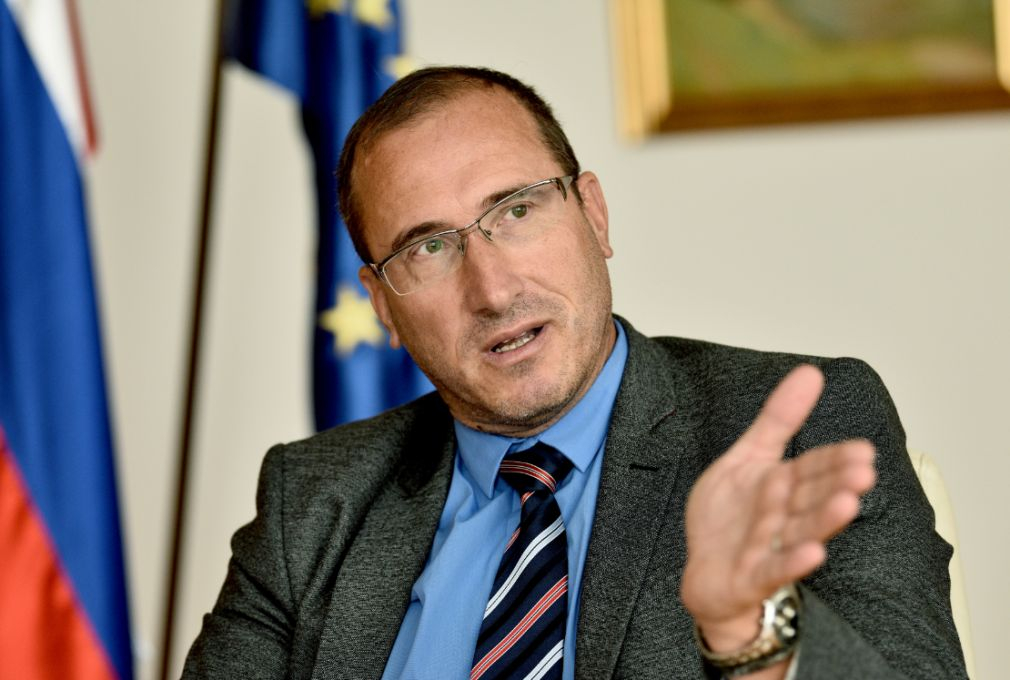By: Domen Mezeg / Nova24tv
We wonder whether Prosecutor General Drago Šketa will soften at least a little and show a gesture of solidarity towards suffering Ukrainian women, children, orphans, the disabled, etc. trampled by Russian tanks, and will withdraw from the recently signed agreement with the Russian State Prosecutor’s Office in Moscow? Or will he stubbornly insist on it, either out of selfishness or some other (private) motives?
This time, the Požareport portal writes that Slovenia is divided again. This time around the catastrophic situation in Ukraine related to the Russian invasion there. While the majority stands on the side of the victim – at the expense of the trampled Ukrainian nation, we have a large “team” of left-wing Russophiles (Putinophiles), who in one way or another self-oppose the role of collaborators with the occupying Russian regime. Until recently, this was bordered by Uefa President Alexander Čeferin, who lacks the determination to seriously sanction Russian football clubs and Russia. Fortunately, that just happened today. According to media reports, Fifa and Uefa have banned all competitions for the Russians until further notice.
Čeferin is considered one of the main lobbyists of the Russian bank Sberbank, which is plagued by harsh European sanctions, and its European branch is even threatened with closure. In a similar way, Ljubljana Sheriff Zoran Janković is undecided, who does not want to freeze the official (fraternal) friendship between Ljubljana and Moscow (yet), and return the recognition to Vladimir Putin, as former Minister Anja Kopač Mrak has already done. We also mentioned Drago Šketa, who has also not yet revoked the recently signed agreement with the Russian Public Prosecutor’s Office in Moscow, although his Russian counterpart even has a ban on joining the EU (recall the persecution of the Russian democratic opposition, especially Alexei Navalny).
Two angry human rights activists are also silent – Nika Kovač and Tea Jarc. Some at the Chamber of Commerce and Industry are also against for Slovenia to join European countries, which demand the exclusion of Russian banks from the SWIFT system intended for international business. We are talking especially about Tibor Šimonka, the director of the company SIJ and the president of the Chamber of Commerce and Industry, and he is also the former director of Perutnina Ptuj. And finally, we should mention the inspiring portal Insajder, run by the former journalist of Dnevnik and Mladina – Igor Mekina. The portal’s reporting makes it clear that this is a typical trumpet of Putin’s political-military propaganda machinery.
Šketa was present at the infamous dinner, which was the introduction to the visit of Russian Foreign Minister Lavrov
In his recent column, Siol’s editor Peter Jančič also addressed Šketa with some excellent words: “He is already embarrassed by the impression that he was placed at the top of the prosecutor’s office to pay for the persecution of Franc Kangler and the collapse of the SLS party. Similarly, Putin is settling accounts with his political opponents and his prosecutors. Many of the big media have not yet dared to report on Šketa’s trip to Moscow and the conclusion of an agreement on cooperation with the Russians. Along with Ukraine, there have also been many unusual reactions in the media in recent days, showing how much influence the Russians and their ideology have. Those who warned the public about the unusual behaviour when the world was just before the war, Šketa described as attackers on the state prosecutor’s office.” According to Jančič, there are political connections behind the “oddities” regarding Šketa and Slovenian pro-Russian journalists, but not the usual ones when it comes to cooperation between individual countries.
Part of Slovenian politics is strongly marked by Putin’s close ties. For example, Karl Erjavec, who, after the occupation of Crimea, offered to be a mediator between the EU and Russia. Last year, the KUL opposition even offered Erjavec as Prime Minister. Jančič also recalls Janković’s frequent meetings with Russian representatives. One meeting was also attended by the President of the Russian Supreme Court Vyacheslav Lebedev, the Ambassador of the Russian Federation Doku Gapurovich Zavgayev, the President of the Supreme Court Damijan Florjančič and his Vice President Miodrag Đorđević. Šketa was also present. The famous dinner took place in the Strelec restaurant in Ljubljana. And what is crucial: it was an introductory meeting before the visit of Russian Foreign Minister Sergei Lavrov.
